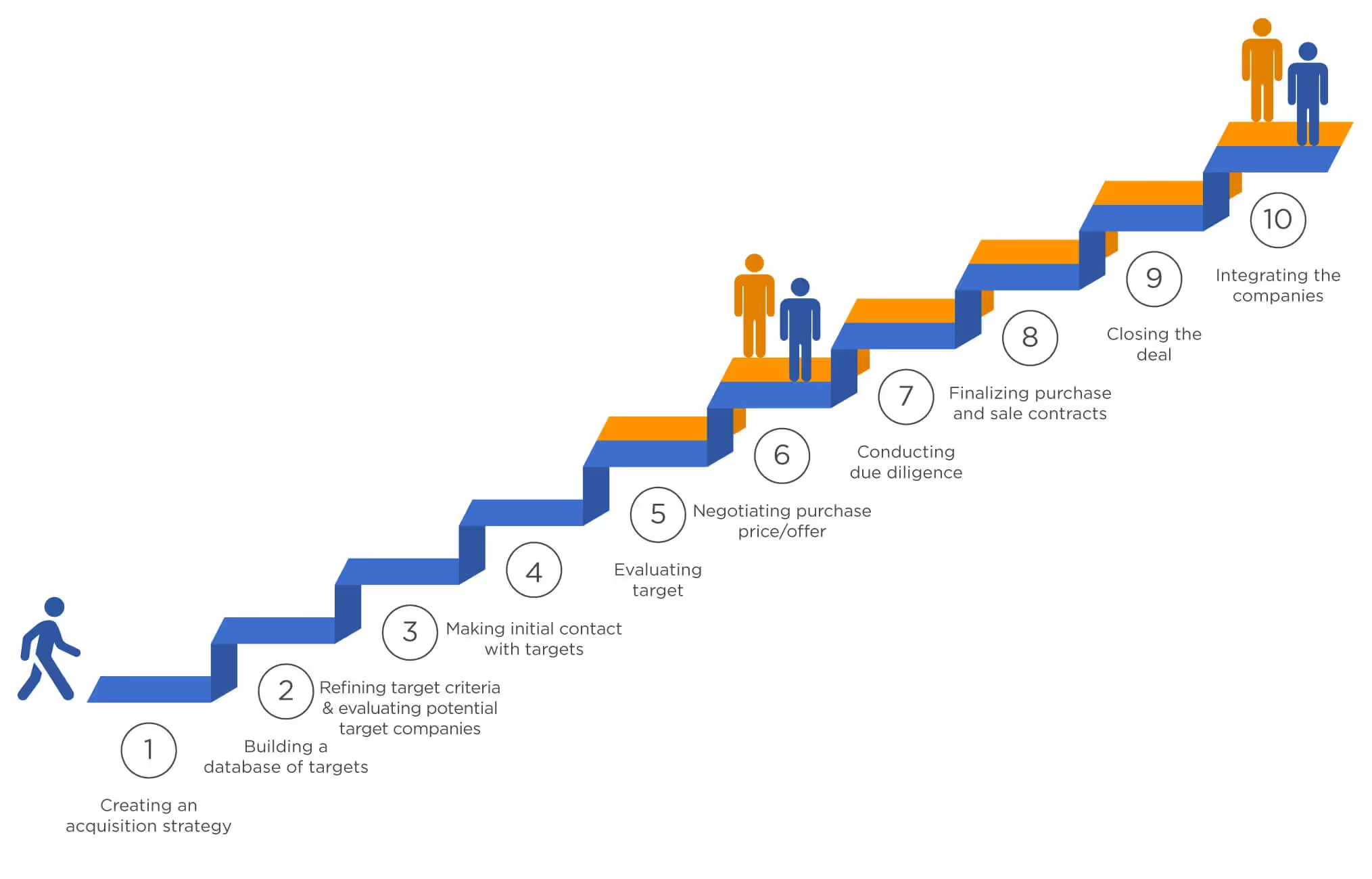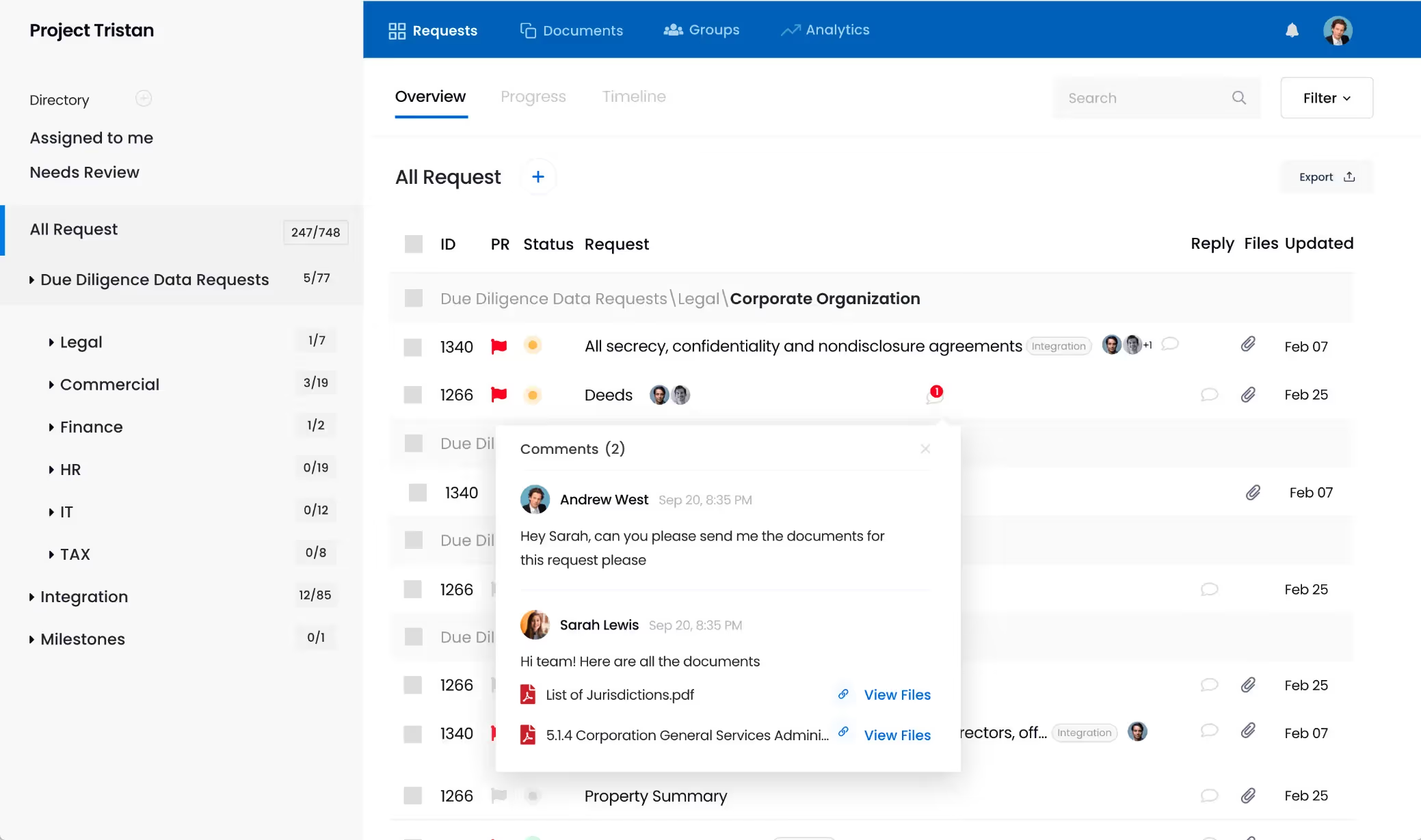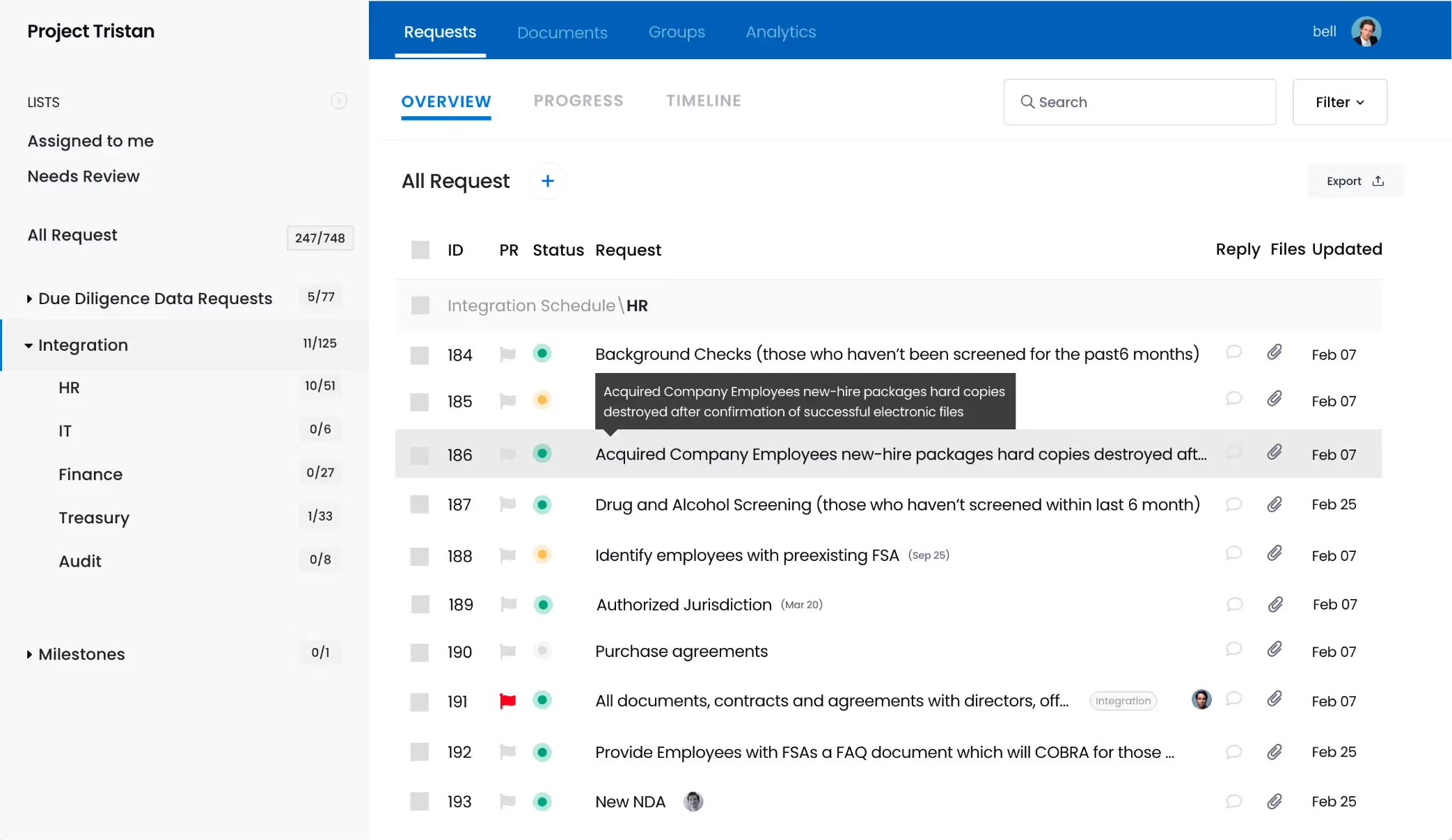Knowing the steps that lie ahead in a typical M&A process allows participants to begin preparing in advance.
Naturally, this preparation means bringing together the relevant documents.
More importantly, it means thinking about your approach to negotiations, questions you’d like to ask during due diligence, and people in your team that will need to be engaged.
What follows is a chronological outline of the M&A process as it happens for most companies. By its nature, this is general - and some steps on the list can occur concurrently - but most deals won’t stray too far from this path.
There’s also some flexibility in the timeline, with more experienced M&A practitioners usually being able to close each step faster than average.
At DealRoom we help dozens of companies organizing their M&A process and in this article we share ours and our client experience about stages of successful M&A.
Stages of Mergers and Acquisitions: Steps for Ensuring Deal Success
- Creating an acquisition strategy
- Building a database of targets
- Refining target criteria and evaluating potential target companies
- Making initial contact with targets
- Evaluating target
- Negotiating purchase price/offer
- Conducting due diligence
- Finalizing purchase and sale contracts
- Closing the deal
- Integrating the companies

1. Creating an acquisition strategy
Buyers must begin by determining what they are hoping to gain from their acquisition; possibilities include:
- growth
- exposure to new markets
- competition elimination
- lowering costs by tapping into synergies.
You can read more about acquisition strategies in other DealRoom resources here.
Read also
How to Apply M&A as a Business Growth Strategy
How to Write Effective Business Acquisition Plan [+ Template]
2. Building a long list of targets
With a clear acquisition strategy in place, and a motivation for your deal established, the next step is deal sourcing and origination.
This isn’t as easy as it sounds, as the majority of entrepreneurs and company owners aren’t operating their businesses with the intention of an immediate sale.
There are a range of good sources, from industry association lists and LinkedIn, that can be used to find suitable companies, but the likelihood is that you already have a few in mind.
If you’d like to extend your reach a little bit to find attractive companies outside your immediate orbit, DealRoom has a few guides to aid you in this process.
Read
A beginner’s guide to M&A deal origination
The best strategies for advantageous deal sourcing
Behind the scenes: Effective deal sourcing and closing
3. Refining target criteria and evaluating potential target companies
Once the acquirer has its initial list, it will want to refine the list by establishing criteria for target companies.
Here, corporate development teams will want to consider both deal size and type. As they identify their pillars of criteria, teams should build lists of “A” deals and “C” deals.
An “A” deal would be ideal in terms of both size and strategic fit, as well as being a strong M&A target. The notion behind creating lists of “A” deals and “C” deals is to help the buy-side from getting overly aggressive or paying too much for an acquisition.
Finally, they must take their databases and input them into a data room or project management platform where they can be stored safely, easily organized, and shared.
4. Making initial contact with targets
With a long list of potential acquisitions established, it is now the turn of corporate development teams to work the list by approaching companies directly.
The challenge here is to find the right person to speak to.
Depending on the size of the company, this can generally be done through LinkedIn. The best people to approach are:
- CEOs
- board members
- heads of strategy
- heads of corporate development.
There’s no right or wrong way to approach them, but subtlety rather than directness is usually a good tactic.
Be honest but subtle: Letting them know that your intention is to buy them out risks receiving a blunt response. Be creative with your approach.
Related: Best Mergers and Acquisition Courses
5. Evaluating target
When the buy-side connects with the seller, a large portion of the task is to listen in order to gather as much information on the potential sell-side as possible.
After the call, a thorough review of current financial statements, revenue numbers, and KPIs is necessary.
If the acquirer does not have enough data to fully evaluate the target, the next step would be to send the sell-side an initial data request.
The acquirer can utilize this information to see if moving forward in the M&A process steps would not only be a strong strategic fit, but also a financial one.
6. Negotiating purchase price/offer
Being well prepared will allow you to anticipate much of the negotiations process.
For example, the better your valuation analysis of the target company, the stronger the footing you’ll have when making an offer. Sellers are usually quite forthright in what price they’re looking to achieve, but this is just an opening gambit.
Write a well-structured letter of intent (LOI) to make your initial offer. This is a non-binding document common to all deals. There are lines and paragraphs in the letter that will change as part of a normal negotiation process.
7. Conducting due diligence
After the sell-side accepts the buy-side’s offer, a comprehensive examination of the target begins. It includes examination of:
- assets
- operations (including its employees, customers, intellectual property, and financial records)
- legal matters
- other.
This deep-dive into the target is known as due diligence.
Historically, it is categorized as somewhat overwhelming and exhausting as there are many stages of due diligence. Recently, two movements in the M&A world have been leveraged to ease the pain of diligence by increasing efficiency and breaking out of work silos.
First, secure virtual data rooms (VDRs) and diligence software allow for all the diligence information to be safely stored and easily shared between stakeholders.
Many traditional virtual data room providers strictly offer secure data storage, however, there are now more modern platforms like DealRoom that also offer features that help improve workflow and transparency, while also reducing redundant tasks.
Second, Agile principles can be of great assistance with establishing governance and a cadence of meetings, as well as with prioritizing tasks.
It should be noted that before diligence begins the buyer will often have to sign a confidentiality agreement put forth by the seller.

8. Finalizing purchase and sale contracts
The due diligence process will typically lead to some small tweaks in the share purchase contract (the SPA).
These issues can vary from additional clauses like ‘subject to this issue being resolved by…’, to more extreme cases such as the deal having a grace period whereby revenue has to grow by an agreed amount or the buyer receives a discount.
Be aware that the larger the change to the initial LOI, the more likely your demands are to be seen as bad faith, the more likely the deal is to fall through.
The purchase contract is a binding agreement that usually involves some form of deposit on behalf of the buyer. The deposit is non-refundable and is meant to show good faith between the parties involved in the deal.
9. Closing the deal
Assuming no last-minute hiccups, the deal can close when all relevant parties have signed the SPA.
This is followed by an exchange of the company’s share certificates, which, until this time, have been in the hands of an intermediary - a pre-agreed attorney of the two companies.
When the intermediary is satisfied that everybody has held to their side of the deal, (s)he will transfer the share certificates to you by registered post.
10. Integrating the companies
Post-closing there is a still a great deal of work to be done.
Post-merger integration (PMI) is the process of bringing two or more companies together with the aim of maximizing synergies to ensure the deal lives up to its predicted value.

Post-merger integration problems are often the Achilles heal of M&A as they tend to cause deals to fail, or, at the very least, result in the inability to extract true value from deals.
Consequently, integration practices are now being more closely examined and valued by both buyers and sellers.
Expert practitioners agree that post merger integration process steps must begin at the beginning of the deal. Namely, integral team members such as top executives and other stakeholders (bankers and lawyers) should begin discussing integration details at the start of the M&A process.
Another vital piece of a smooth integration is being sure members of the diligence team become members of the integration team - for both the sake of clear communication and efficiency.
There are even software providers that are now including post-merger integration features to help with this.
Finally, the people aspect of integration is key since people make companies great and are a vital part of leveraging synergies.
Clearly, human resources should be a player in the integration process; ideally, a change management expert should also be included.
These individuals help address employee concerns, learn about the target company’s culture, focus on retaining key employees, and identify roadblocks related to culture and change management.
Learn more about change management here.
Final Thoughts
While working through the stages of mergers and acquisitions, it is essential to keep the ultimate goal at the forefront - a profitable deal that looks good not only on paper, but also in practice.
Additionally, after the completion of a deal, companies should consider an eleventh step: a retrospective or “lessons learned” step that includes feedback from all leadership teams as well as from a wide variety of employees on both sides of the deal.
Similar to how information on target companies is kept in virtual data rooms or project management platforms, the information from the retrospective should be organized and stored in a similar manner so it is easily accessible when it is time to begin the M&A process again.



.avif)
.jpg)















.avif)
.avif)
.avif)



.avif)
.avif)
.avif)




.png)
.png)
.png)
.svg)

.svg)
.avif)
